DAVE'S DIARY - 9 AUGUST 2005 - JAMES TALLEY
JAMES COUNTS THE TALLEY OF MUSIC ROW
"Now people let me tell you about this Nashville town/ 25 years I've watched the deal go down/ written every kind of song, sung every kind of tune/ been treated every kind of way, had every kind of blues/ aw, people, it's a cryin' shame/ I've got them Nashville city blues/ and I ain't leavin' this town, people, 'til I get paid." - Nashville City Blues - James Talley.
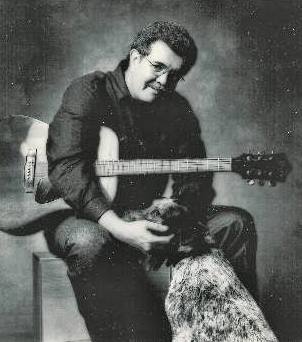 |
The
first time I saw Oklahoma born singer-songwriter James Talley he
was hanging out at an Eric Andersen concert at the Lone Star Café
in New York City. But let's go back to my live entrée to Talley's music in 1978. |
It was just
a year after Talley played the inauguration concert for President Jimmy
Carter who owned his 1975 debut LP, Got No Bread, No Milk, No Money,
But We Sure Got A Lot Of Love and successors Tryin' Like The Devil
(1976) and Blackjack Choir (1977).
But despite enjoying presidential patronage akin to latter day White House
warriors Shotgun Willie Nelson and Kinky Friedman this was not a career
catalyst suffice to sustain stardom for Talley.
Talley worked as a carpenter to finance his autobiographical debut album
before he signed with Capitol - the 12-album veteran has financed his
recent discs from his off stage real estate career.
The wide acclaim for the singer's vivid vignettes about his rural roots
was favourably compared to Woody Guthrie and featured in my letters from
America but was not the Trojan horse needed to leap over radio moats.
Sure, Talley again made his name in Music City 22 years ago - not just
as a singer but also as a real estate agent.
So how did I know that - I saw his realtor signs on my last U.S. sojourn
in 1988 and learned of his joint careers.
Now, 17 years down the Lost Highway, Talley is reaping the benefits of
exposing his music to new audiences at home, Europe and here in Australia.
CIMARRON LABEL
| Talley
has released his new albums on his indie Cimarron label and also retrieved
the rights to his embryonic discs that were swallowed up by the Capitol
conglomerate and withered on the sales vine. Talley, now 60 rescued those albums from Germany's Bear Family label who haven't paid him since releasing them as single and double discs. |
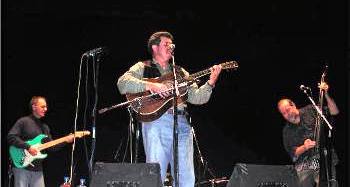 |
But Talley bit the bullet and emulated the late, great Doug Sahm and Ed
Burleson and recorded album of songs, Touchstones, at Tommy Detamore's
Cherry Ridge Studio in Floresville, Texas.
That was where Sahm cut his final studio disc, The Return Of Wayne
Douglas - it also meant James was a beneficiary of pedal steel of
Detamore and fiddle, mandolin, bajo sexto by Bobby Flores.
Touchstones was also enriched by guests Joe Ely on W Lee O'Daniel
And The Light Crust Doughboys, accordion from Ponty Bone, bassist David
Carroll, pianist Ron Huckaby, drummer Dan Dreeben and trumpeter Al Gomez.
But this time Talley is in charge of his destiny - he paid producer and
piper and owns the music - culled from his early discs - on his 11th album.
NASHVILLE CITY BLUES
Nashville
City Blues is too modern to be included but is relevant and maybe a reprise
for one of his memorable early tunes Are They Gonna Makes Us Outlaws
Again?
"Yeah, people let me tell you about this Nashville town/ they've
taken all the music and watered it all down/ they've taken its heart,
they've taken its soul/ they wouldn't know old Hank if he came walking
down the road/ people, it's a crying shame, old Hank had something to
say."
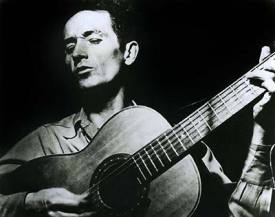 Woody Guthrie |
So
did Guthrie who inspired Talley from the sixties and belatedly triggered
his album Woody Guthrie And Songs Of My Oklahoma Home recorded
in 1994 and released in 1999? "My father was born two years before Guthrie, my mother two years after," Talley revealed. "They both came from that same Dust Bowl, bound-for-glory period. And I grew up with that - flour sacks stitched together for bed sheets, no running water. When you come out of that, you really understand what Guthrie was all about." |
Talley's
disc, cut in four days at Stepbridge Studio in an old adobe house in Santa
Fe, New Mexico, wasn't the first Guthrie tribute album but was more credible
than others by artists with less empathy for the dust bowl legend.
The 21 songs include Pretty Boy Floyd who won a name check in Talley's
tune Are They Gonna Make Us Outlaws Again?
Belated release is not new for the former case-worker for New Mexico's
Department Of Public Welfare who wrote most songs for his 1992 album,
The Road To Torreon 24 years before its release.
The album, released without licence by Bear Family, was accompanied by
Cavalliere Ketchum's photos of Hispanic Mountain Families whom Talley
worked with before invading Nashville in August, 1968.
James was born in Pryor and moved to Commerce, Oklahoma, hometown of baseball
legend Micky Mantle, a few months after his birth.
But towards the end of World War II they headed to Richland, Washington
- source of the song of the same name about his father working in a plutonium
plant.
TOUCHSTONES
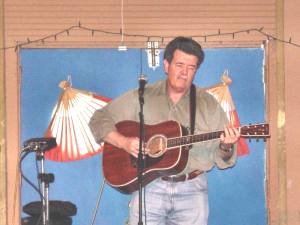 |
That
historic song was one of 16 re-recorded for Touchstones and
reinforces Guthrie influences. Talley blames exposure to plutonium for the death of his guitar-playing dad at the age of 57 - his mother, a retired schoolteacher, is now in her eighties. "He made plutonium in Richland, Washington/ he bought our groceries, he paid our rent/ it was a pretty little town, that Richland, Washington/ where my daddy worked at the Hanford plant." |
History repeats
- the plutonium was used in "fat man" bombs dropped on Nagasaki
in Japan.
Talley says: "It's probably where my father ruined his health because
when we moved to New Mexico they found a big tumour on one of his lungs
nobody could identify."
The singer, whose family later moved to Albuquerque in New Mexico, proved
more than just master of salient satire.
Up From Georgia, Sometimes I Think About Suzanne, Not Even When It's
Over and To Get Back Home are evocative love songs.
Give My Love To Marie enables the singer to combine love and social
comment and W Lee O'Daniel And The Light Crust Dough Boys is an ode to
the famed, historic Cain's Ballroom in Tulsa.
Although they date back 25 years they benefit from fresh Texas production
and have stood the test of time.
LIVE
FROM LONE STAR CAFÉ
Some appeared on his 1979 live album recorded at the Lone Star Café
and the Great South East Music Hall in Atlanta.
And to prove that Talley tempered his cynicism for the music industry
with humour he finishes his live disc with the traditional tune, Take
A Whiff On Me.
Maybe to entice prospective buyers for river frontage he sings this refrain
- 'two old maids a fishin' in the creek/ ain't caught a man since way
last week.'
Talley is ecstatic about the reaction to the belated release of his material
- long out of print - on CD on Cimarron.
Although he cut his debut album for just $5,000 from his carpentry earnings
in 1975 its value appreciated over the years with a new generation discovering
his music.
Talley earned acclaim in the L A Times, Rolling Stone, Village Voice and
a chapter by Peter Guralnick in his Lost Highway book.
Now he is elated to be belatedly discovered by the No Depression flame-throwers
and the cyber chappies and chappettes.
"The wonderful thing about resurrecting my music through my new Cimarron
label, has been the discovery of twenty-five years of good will that exists
out in the world," Talley told me from his Nashville home, "people
I never knew personally before have been so very kind. In my darkest hours,
friends of mine would assure me that good music would eventually find
its way. The Internet is such a wonderful communication tool. The world
is now a small place.
"We had the Woody and Nashville City Blues albums in the can, unreleased,
for so long. I am trying to get Bear Family to stop issuing my work, as
they have never paid me a dime for using any of it. Since I paid for all
the production - musicians, studio time, tape, etc. - allowing them to
continue releasing the music for free doesn't do me much good. And when
we reissued the catalogue, I didn't want to have to compete with them."
You can purchase the complete works of Talley from select import stores
or visiting www.cimarronrecords.com
"It will break your heart and it will knock you down/ the glitter
and the glamour, it's a big-time game/ and people, the music, well it
don't mean a thing/ it's all about the money that's made/ aw people it's
a crying shame/ I got them Nashville city blues/ and I'm not leaving this
town till I get paid."
And, if you buy enough, we might persuade Melbourne roots promoter Rob
Hall to tour Talley in Australia - maybe they could buy some venues to
showcase the best roots music.
"Who knows, maybe my work will gain enough popularity there, so I
can come and perform, before I get too old and decrepit to do it!",
says Talley, "I appreciate your support so very much; you take care."
FIFTH
GENERATION COUNTRY MUSIC
JAMES TALLEY AND CHET FLIPPO
| "You
know, I think we're now living in the fifth generation of country
music," Talley recently told Nashville columnist and author Chet Flippo. The first generation of country music started with the Carter Family and Jimmie Rodgers and extended through Hank Williams in the 1940s and early 1950s. The music reflected its simple beginnings and rural roots. "The second generation reflected the more urban taste of people like my mother," said Talley, "who grew up on a farm in Oklahoma and danced to Bob Wills at Cain's Academy in Tulsa. Wills was the transitional figure who added sophistication to the early string band sound with three fiddles and horn sections. |
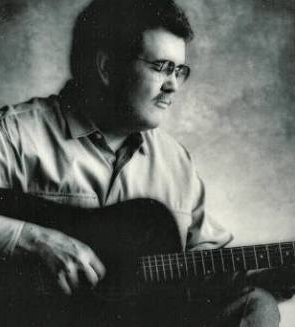 |
The second-generation audience was proud that they were now living in town or in the city, they had come through the Great Depression and now they had a good job in the post WW II society and were moving to the cities and were no longer following a plow.
Country music moved more uptown with artists of that generation, like Jim Reeves, Patsy Cline and Ray Price. They represented the advent of what came to be called the 'Nashville Sound.' It had lusher string and vocal arrangements. It was smooth, not corny, and it reflected the newfound urban post WW II success of its audience. The second generation era continued in many forms, but to me it sort of ended with the production style of Billy Sherrill as it gave way to the third generation."
THIRD GENERATION COUNTRY
Talley identified the third generation in the 1970s as his generation."We rebelled against the strings and the producers' control," he said.
"We wanted to make our music as we felt it should be made - as we felt it. We were the artists, and we wanted control of our music and our lives. The record companies' job, as we saw it, was not to 'produce us' and tell us how to say what we had to say ...
but to take what we had to say and sell that! Much like it was with the artists of the first generation, and we found kindred spirits in the artistic integrity of the first generation - Will the Circle Be Unbroken! It was a return to the simplicity of the first generation."
Talley's
generation brought steel guitars and fiddles and a traditional edge back
to country.
"That was what people like me, Steve Young, Doug Sahm, Jerry Jeff
Walker, Guy Clark, and Waylon and Willie were trying to do," Talley
told Flippo.
"It was also the generation of the songwriter. Even though Hank wrote
most of his material and Lefty wrote a lot of his, the artist then was
the focus; not the fact that he was a songwriter. We were also of the
Vietnam generation. We were hippies; we questioned authority and the status
quo. We wanted to make country music the same way the Beatles made pop
music. We wanted albums without filler, with meaningful, well-written
material."
FOURTH GENERATION COUNTRY
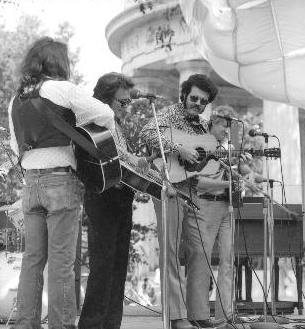 |
The
industry changed drastically after the recession in the 1980s, ushering
in what became the fourth generation. Economic changes caused mergers and shutdowns in the record industry. After the album Wanted: The Outlaws introduced Nashville to the platinum-selling era, commercial expectations were higher for artists and record labels alike. The audience was also changing. "Most of us third generation folks could not get arrested at record labels at that time," said Talley. "Willie and Waylon did survive, as they had strong enough footholds to weather the transition. Us third generation folks were too old. |
People like
me had to find day jobs to feed our families. There was a new generation
of listeners who had been raised on rock, and they wanted a rock sound."
Another important shift occurred as a result of the changing economies
and new sales expectations.
Manufactured stars and assembly line songs and production came to dominate
Nashville.
"In the early days of the first generation," said Talley.
"The labels went out in the field and sought out musicians that had
a unique style and with something to say - Rodgers, the Carters, Bob Wills,
Hank, Lefty Frizzell and the others. In the fourth generation of Garth
Brooks, Brooks and Dunn, Alan Jackson and the rest, it was big business.
The producers were making music based on marketing research and focus
groups."
CD REVIEW 2004 - THE JOURNEY
"I saw the buildings fall from the sky/ I saw the people, I watched them die/ I saw it all on the morning news/ I saw what hate will do." - I Saw The Buildings - James Talley.
| When
James Talley cut half of his first live album at the now defunct Lone
Star Café in Greenwich Village in 1979 he mastered a raw, organic
country blues hybrid. Although Talley's disc was belatedly released 15 years later on Bear Family three songs were revamped for a new live disc Journey (Cimmaron), cut in Italy in 2002. One of them was his 1974 tribute to W Lee O'Daniel And The Light Crust Doughboys - on whom the singing Governor in O Brother Where Are Thou was reportedly based. And the famed Cain's Ballroom in Tulsa in his home state where Pappy O'Daniel, Bob Wills & the Texas Playboys reigned. |
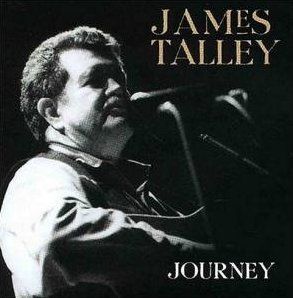 |
Although
Talley chose that as entrée to his 12th album he also showcased
five new songs.
I Saw The Buildings is one of the most evocative parables to emerge
from the carnage and rubble of his one time adoptive home on September
11, 2001.
Talley, now 60, examines the effects of the grief - the vitriol of the
victims and survivors - and the futility of the prolonged Palestine-Israel
war.
"I saw the children of Palestine strap on their bombs/ I watched
them die" and "I saw the young men of Jerusalem/ with their
tanks and with their guns/ through the broken dreams they pursue."
CHIEF JOSEPH
Talley's
strong suit is narratives plucked from ancient and modern history.
Another new ode for an old hero victim is The Song Of Chief Joseph
- a Nez Perce Indian chief who tried peace in wars over tribal lands seized
by the U.S. government after the 1863 gold rush.
"I heard the thunder from the mountains/ I saw the blood there on
the plain/ I feel a sorrow never ending/ among the tears, everlasting
pain."
Chief Joseph, born in Wallowa Valley, Oregon, in 1840, reportedly died
from a broken heart in 1904 long after a bloody surrender in 1877.
"Once this great land was my home/ where my people freely roamed/
now the world is torn apart, there is darkness."
It's not surprising Talley chose a live album, cut over three nights in
Italy, to showcase such powerful new songs.
Talley bought back rights to all albums for his Cimmaron label.
He owns all his discs and produced this with fellow musician Jono Manson.
Talley plays acoustic guitar in his band featuring famed bassist Dave
Pomeroy, guitarist Mike Noble and drummer Greg Thomas.
Talley's powerful vocals ignite Tryin' Like The Devil, Up From Georgia
and Richland, Washington - a pathos primed eulogy to his father.
And he lightens up with My Cherokee Maiden and celebratory Somewhere
On The Edge Of The World.
Talley has had songs cut by late Johnnies - Cash and Paycheck - and superstar
Alan Jackson but the latest was Moby who rewrote Talley's 34-year-old
song She's The One as Evening Rain for Ben Affleck's 2003
movie Daredevil.
James' extensive liner notes reveal like Texan superstar George Strait,
he has two blue heelers - Shiloh and Cheyenne.